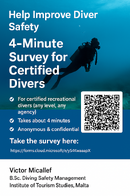Victor Micallef
New
Academic study exploring how certified divers recall and apply their training limits.
Hi everyone
I’m Victor Micallef, a student on the B.Sc. in Diving Safety Management at the Institute of Tourism Studies (ITS), Malta.
I’m conducting a short anonymous international survey to understand how certified recreational divers remember and apply the safety limits taught during their certification — such as depth, gas, and supervision/buddy rules.
 Take the survey here: Microsoft Forms
Take the survey here: Microsoft Forms
or scan the QR code in the attached image below
Your input will help highlight how well safety concepts are retained after certification and may inform future improvements in diver education.
I’ll post a public summary of the findings here once analysis is complete.
Thank you for taking part and for sharing this with other divers or club members.
Best regards,
Victor Micallef
B.Sc. Diving Safety Management — Institute of Tourism Studies, Malta
 victormicallef23@its.edu.mt
victormicallef23@its.edu.mt
Hi everyone
I’m Victor Micallef, a student on the B.Sc. in Diving Safety Management at the Institute of Tourism Studies (ITS), Malta.
I’m conducting a short anonymous international survey to understand how certified recreational divers remember and apply the safety limits taught during their certification — such as depth, gas, and supervision/buddy rules.
- Who: Certified recreational divers (any agency, any level)
- Time: About 4 minutes
- Privacy: Completely anonymous – no personal data collected
- Purpose: Academic research only
or scan the QR code in the attached image below
Your input will help highlight how well safety concepts are retained after certification and may inform future improvements in diver education.
I’ll post a public summary of the findings here once analysis is complete.
Thank you for taking part and for sharing this with other divers or club members.
Best regards,
Victor Micallef
B.Sc. Diving Safety Management — Institute of Tourism Studies, Malta




